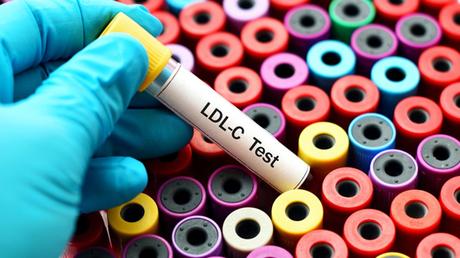You've probably heard of low-density lipoprotein (LDL) cholesterol and how high levels are linked to a higher risk of cardiovascular disease. Medical societies recommend lowering LDL cholesterol to reduce heart-disease risk, and cholesterol-lowering medications are among the most widely prescribed medications in the industrialized world.
However, some clinicians have begun asking the question: in people without existing heart disease, are there subsets of people where high LDL could be closely monitored, as opposed to automatically treated?
At Diet Doctor, we've scrutinized the science and the theories to better understand whether it's at all reasonable to question whether all instances of elevated LDL merit the same level of concern. We hope this guide will help you better understand where nuance may exist in the evaluation of elevated LDL and overall cardiovascular risk.
Of note, this guide primarily focuses on those without existing cardiovascular disease - so-called primary prevention. When it comes to secondary prevention - treating people with known heart disease - we are not questioning the benefits of lowering LDL, which are well supported by the literature.

Get your personalized meal plan with a FREE 30-day trial!
Elevated LDL cholesterol is associated with increased cardiovascular risk
Observational studies in the general population show an association between elevated LDL cholesterol and an increased risk of developing cardiovascular disease. This association is true of studies in the general population and those done in people with specific genetic mutations that increase LDL levels.
In addition, genetic mutations that lower LDL levels correlate with a lower risk of cardiovascular disease.
Furthermore, lowering LDL with medications can reduce cardiovascular risk. For example, statins, ezetimibe, and PCSK9 inhibitors each work to reduce cardiovascular risk.
A wealth of scientific data demonstrates that elevated LDL levels correlate with at least a small absolute increased risk of cardiovascular disease in the general population, with even stronger evidence for those with existing heart disease - so-called secondary prevention.
However, many people may be surprised to learn the small size of the absolute risk associated with elevated LDL in the general population. Likewise, the degree of benefit from lowering LDL is fairly consistent across multiple studies, but again it is quite small in terms of absolute benefit for primary prevention. It may help to explore the degree of harm or benefit more deeply.
The magnitude of risk from higher LDL
Studies suggest that an elevated LDL level could increase cardiac risk fivefold over 35 years. But what does this mean?
A fivefold increase is a relative increase, so if the baseline risk is very low, like 0.25%, then a fivefold risk is still small in an absolute sense. In this example, 0.25% risk goes up to 1.25%, for just 1% of increased absolute risk. With a higher baseline risk of a cardiac event, such as 5%, a fivefold increase is much more significant - increasing risk to 25%, for a 20% increase in absolute risk in this case.
However, other studies suggest LDL is not the most important predictor of heart disease.
One study found the risk of heart disease attributable to elevated LDL in women was significant, with a hazard ratio of 1.4. However, markers of metabolic health were far more predictive than LDL. For instance, a marker of insulin resistance had a much higher hazard ratio of 6.4; having high blood pressure or diabetes had significant hazard ratios of 4.6 and 10.7, respectively.
Other studies suggest that lipoproteins rich in triglycerides - so-called "remnant cholesterol," like VLDL particles - impact heart risk more than LDL cholesterol.
In addition, some of the original data correlating elevated LDL with heart-disease risk showed that low HDL values correlated much more strongly than high LDL.
So it appears that focusing on an elevated LDL level, without examining the broader picture of metabolic health, triglycerides, HDL, and remnant cholesterol, may not accurately capture risk. This is particularly true when the other markers are in the healthy range.
The magnitude of LDL-lowering benefit
When interpreting the benefit of statin therapy, it is important to understand the difference between relative-risk reduction and absolute-risk reduction.
For example, one study suggests lowering LDL by 38 mg/dL (1 mmol/L) reduces relative cardiac risk by 21%. But, the absolute-risk reduction is much lower, showing a 1% reduction over five years - meaning that treating 100 people for five years will prevent one heart attack.
Other trials show a more significant effect, such as the West of Scotland study. But even at the higher absolute-risk reduction of 2.4% over five years, preventing one cardiac event requires treating 41 people for five years.
And in lower risk individuals, the absolute benefit is even smaller.
Many believe that the benefit will continue to increase beyond five years, but longer term, randomized controlled trial data are sparse.
From a public health perspective of treating millions of people and preventing tens of thousands of heart attacks, the magnitude of relative-risk reduction from LDL lowering is encouraging. But for the individual patient trying to decide if they should take a medication, the absolute benefit may seem less obvious.
We also should note that not all LDL-lowering medications reduce cardiac events. One class of drugs, CETP inhibitors, showed an increase in cardiac events despite significant LDL lowering. Since the benefit of LDL lowering can be small, it may not take much of an added risk to undo the potential benefits of decreasing LDL.
None of this is meant to suggest that LDL is unimportant. On the contrary, LDL is clearly an important marker for heart disease risk. But the question we need to ponder is, how does LDL fit into the broader picture of cardiovascular risk?
Does elevated LDL actually cause heart disease?
Most medical societies agree that elevated LDL causes heart disease. However, a more nuanced hypothesis holds that LDL is necessary but not sufficient for the development of atherosclerosis.
LDL is involved in the formation of vascular plaque. Still, it is unclear whether LDL causes the initial vascular injury, or if another process (such as hypertension, vascular inflammation, or endothelial dysfunction from chronically elevated blood sugar) is required first, with LDL joining the process already in motion.
A detailed analysis of all the theories of atherogenesis is beyond the scope of this guide. But suffice it to say that atherosclerosis is a multistep process involving vessel injury, inflammation, a healing response, lipid oxidation, and plaque formation.
We believe it is possible that elevated LDL does not cause atherosclerosis in patients who do not have metabolic dysfunction, chronic inflammation, or high remnant cholesterol levels. But - and it is a big "but" - we lack conclusive evidence to support this hypothesis.
Further, we recognize that there may indeed be a threshold (absolute) number for LDL that - when exceeded - directly drives cardiovascular disease, regardless of the existence of any metabolic abnormalities.
Patients in whom high LDL may not be as concerning
LDL increases the risk of cardiovascular disease on average in most published studies. However, the problem with averages is there are often subgroups that fall below the mean and do not experience the elevated risk.
Here are a few examples of studies suggesting certain groups are much less likely to have adverse health outcomes despite elevated LDL:
- In the 4S trial - a study using simvastatin in patients with a recent heart attack - the most significant benefit occurred in patients with elevated LDL and elevated triglycerides along with low HDL levels. There was no significant benefit of treatment for those with high LDL and normal triglycerides with normal HDL levels.
- Retrospective analysis of the Framingham offspring data demonstrates that those with HDL above 65 mg/dL (1.7 mmol/L) have minimal to no increased heart-disease risk even with LDL levels above 220 mg/dL (5.7 mmol/L).
- A Danish study reports that there was no difference in cardiac events for men with LDL above or below 170 mg/dL (4.47 mmol/L). Instead, risk increased with elevated triglyceride and lower HDL levels.
- A study reports that over half of 60-year-olds with LDL above 190 mg/dL (5 mmol/L) and a coronary calcium score of zero maintained their calcium score of zero ten years later.
- Observational studies in an older population - defined as over 65, 70, or 75 years old, depending on the study - demonstrate an improvement, or at least no decrease, in longevity with higher LDL levels.
While none of these studies proves LDL is irrelevant to heart disease, they do suggest there are situations where elevated LDL doesn't automatically mean a higher risk of heart disease. Some factors that may mitigate the risk of high LDL include:
- absence of metabolic disease such as insulin resistance
- normal HDL, triglycerides, and remnant particles
- mostly larger, less-dense LDL particles
- the relative absence of oxidized LDL particles
- age over 65 or 75 years
- absence of familial hypercholesterolemia
One other example deserves a special mention. What about those who have an elevated LDL in response to a low-carb diet? We explore the topic of low-carb hyper-responders in the next section.

Get your personalized meal plan with a FREE 30-day trial!
Low carb LDL hyper-responders
Most studies of individuals eating a low-carb or ketogenic diet demonstrate no significant increase in LDL, on average. However, a minority of people may find their LDL cholesterol increases dramatically - these folks are so-called "low-carb hyper-responders."
There is no formal definition for hyper-responders, but we suggest that anyone who starts a low-carb diet and experiences more than a 50% LDL increase and ends up at an abnormally high level is a hyper-responder.
The implications of being a hyper-responder are not clear at this time. Clinical experience suggests that many low-carb hyper-responders tend to have good metabolic health with normal HDL and triglyceride levels - precisely the cohort that appears to be at lower risk from elevated LDL.
In addition, hyper-responders usually do not fit the clinical criteria for familial hypercholesterolemia - the most common population with markedly elevated LDL cholesterol. Therefore, it is not necessarily appropriate to assume hyper-responders should have the same clinical outcomes as those with familial hypercholesterolemia. The mechanisms by which the two groups develop elevated lipids are likely quite different.
Unfortunately, it is premature at this time to generalize about the risk of low-carb hyper-responders.
You can read more about low-carb LDL hyper-responders and what we recommend in our more detailed evidence-based guide.
Suggested workup for elevated LDL
Enough data exist for us to question whether elevated LDL is harmful in all situations. For this reason, we recommend discussing with your doctor what your LDL level means for you as an individual, taking your entire clinical picture into account.
Some or all of the following tests may be appropriate to stratify your cardiovascular risk more accurately:- advanced lipid panel including LDL size and level of oxidized LDL
- metabolic workup including glucose, HbA1c, fasting insulin, HOMA-IR
- lipoprotein(a) [Lp(a)] level
- coronary artery calcium score
- home blood pressure monitoring
- thorough clinical evaluation and possibly genetic testing for familial hypercholesterolemia
If you are looking for a doctor with more experience monitoring the above tests, you can check our Find a Doctor Map to see if you can find a good match near you.

